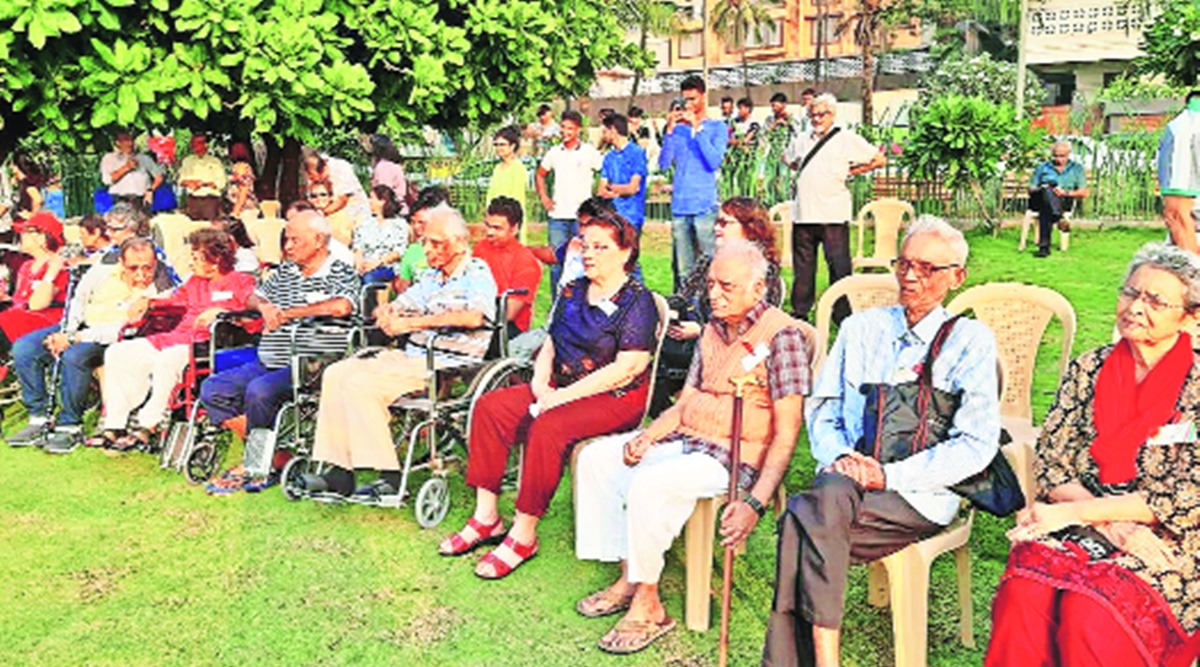 Senior citizens met in Bandra last year to celebrate Christmas. (File)
Senior citizens met in Bandra last year to celebrate Christmas. (File) A year ago, on the breezy Carter Road promenade several senior citizens, some with walking sticks others on wheelchairs, had gathered to sing carols, eat their packed snacks, and chatter with each other merrily into the late evening. This Christmas and New Year they are all bound indoors, struck by fear of the coronavirus, with their only links to the world outside a mobile phone and a seat by the window.
Among those hit by the Covid-19 pandemic, the plight of advanced age senior citizens in metros is perhaps the most invisible. In Maharashtra, senior citizens comprise more than 50 per cent Covid-19 deaths. Many have kept indoors for more than eight months, cooped up inside their homes. For those who children live away, in another town or city, there is little by way of company.
Vithal (70) and Lata Sonawane (69) were the first Mumbai couple to get diagnosed with Covid-19 on March 11. Since recovery, they have strictly kept indoors. A grocery shop delivers everything at their doorstep. The couple has let go of their domestic help and cook and clean the house slowly through the day.
Their two children are settled in Singapore and San Jose, USA. “Our social life is just this TV set…otherwise we would have gone mad,” Vithal Sonawane says, adding that maids may pose ‘risk of reinfection’. Outsiders are not allowed in their Andheri West building, the couple only takes a stroll in the premises once in a few days when no one is around.
“We understand we are old and at risk of infection again. We have no choice but to stop meeting people,” Lata says. And so she cooks, and he cleans. That has been their life for the last 10 months.
“Most elderly people do not want visitors and are scared to step out,” says Serena D’sa, a senior citizen who lives with her husband in Bandra. D’sa calls at least six to seven elderly people in the neighbourhood once a week to check on them, listen to their worries or rants about routine chores.
“Mobile phone is the only way to connect with them now,” she says. D’sa is attached with Connecting Care, a not-for-profit programme where willing volunteers pay senior citizens regular visit to give them company. But since the March lockdown, that has stopped.
John Aroujo (84), who needs a walker, and his wife (78), bed ridden and a heart patient, say in initial months of the pandemic nobody was willing even to help deliver groceries.
“We had to force delivery guys to get us groceries. We are stuck in the house. I was very active before that,” Aroujo says.
The couple has been advised to stay indoors by their family doctor. They have no children. “So I keep myself busy by looking after my wife, by praying and by stocking grocery,” he says.
It gets lonely, he adds, and he misses socialising but realises there is no solution.
His wife suffered a fall three months ago and has been bed-ridden since. “We had to hire a nurse. For that I have to borrow money from acquaintances,” he says.
A nurse or domestic help are the point of social contact for many.
Yoland D’Souza (83) has Parkinson’s disease and has undergone surgery for both knees. She lives with husband Sabino D’Souza (88), who has diabetes, cholesterol problems and fits all check boxes of high risk category that must be protected.
The couple has a day-time caretaker and a night nurse and are totally dependent on external help to mobilise. “I can hardly walk, I have stopped going to church. I need help to visit the garden near my building, when my maid comes I take her along,” she says.
Before the pandemic and before her knee started hurting, she would go on long drives in her son’s car. “We would step out frequently. But we have to restrict all those activities because everybody says we are at risk,” she says.
Her children drop grocery when they need. Yoland, a retired teacher, has a phone to connect with sisters, in USA and Goa, and friends in city.
“But no one in our building steps out or talks,” she says.
On Christmas all her four children visited the couple. “We were all together celebrating after a long time and it felt really good,” she said.
Pouruchisti Wadia, Associate Program Director at Romila Palliative Care, said they are now counselling senior palliative care patients and their caregivers to deal with pandemic anxiety through phone.
“The ideal scenario is in Kerela where we find community care of senior citizens. Everyone is a volunteer and willing to help senior citizens. We need more such people to look after their elderly neighbours in other cities,” she said.